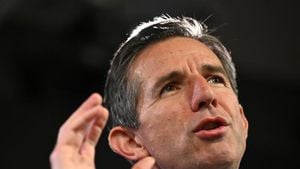As tensions rise around the 2024 Olympic Games in Paris, an unsettling controversy has emerged involving Canada’s soccer teams and accusations of spying on opponents. Reports from New Zealand media surfaced that Canada used drones to surveil the New Zealand women’s national soccer team during a practice session ahead of an Olympic match set for July 27.
The New Zealand women, known as the Football Ferns, claimed a drone hovered over their training session in Saint-Étienne, prompting a quick alert to local authorities. French police responded by dispatching officers to various practice facilities to monitor for unauthorized aerial activity. The situation escalated when Canadian staff members were detained as police launched an investigation into the spying accusations.
In response to the allegations, the Canadian Olympic Committee expressed regret over the situation, attributing the drone’s flight to a “non-accredited” staff member who acted independently. In a bid to control the fallout, Bev Priestman, head coach of the Canadian women’s team, announced her intention to step aside during the upcoming match as a measure of accountability. “This does not represent the values that our team stands for,” Priestman stated, emphasizing her responsibility for the conduct of her program.
The incident has brought to the forefront deeper questions regarding ethics in sports. It wasn’t just an isolated occurrence; as the dust settles, new reports came to light suggesting that both the Canadian men’s and women’s soccer teams have allegedly been utilizing drones for reconnaissance purposes over the years, with implications extending back to their gold medal performance at the 2021 Tokyo Olympics.
Sports ethics expert Sarah Thompson weighed in on the matter, stating, "This raises significant concerns about the integrity of competition. If true, it reflects not just poor judgment within these teams but also a broader issue regarding sportsmanship and respect among competitors."
As Canada faces mounting scrutiny, some experts suggest that other nations might reconsider their practices and strategies in light of the revelations. Given the pressures and expectations surrounding athletes competing at such a high level, the incident could ignite debates about the lengths to which nations will go to gain advantages.
The consequences and repercussions of this scandal remain uncertain. The international soccer community is watching closely as more details unfold. Will Canada face sanctions? What actions will be taken by the International Olympic Committee in light of this incident? The answers are yet to be determined, but as the Olympics approach, every point of scrutiny will be magnified.
Still, athletes and coaches on Team Canada must now grapple with public perception overshadowing their commitment to fair play. While they conduct their preparations, larger questions loom: How does one balance competitive drive with ethical behavior in a world where the spirit of sport is often tested?
The slippery slope of using technology in sports raises concerns about what constitutes fair play. With the Olympics celebrating the essence of sportsmanship, integrity, and national pride, Canadians will have to ponder whether their teams' actions reflect the commitment to these values or a desperate reach for victory at any cost.
Moving forward, scrutiny will not only focus on the Canadian teams, but it will also drive discussions about regulatory frameworks governing sports internationally. Many athletes and fans hope for a fair examination of practices and a re-emphasis on the fundamental values that define sportsmanship.
As the Olympic Games inch closer, Canadians will be hoping to restore their image as athletes deserving of admiration rather than scrutiny. However, the road to redemption will depend upon how transparently the situation unfolds and whether the culture of competition shifts to prioritize integrity alongside achievement.
In the words of Priestman, “We must do better.” The inquiry’s outcomes could set a precedent that reverberates through the future of international sports—transforming not just how nations prepare for competition but also how young athletes learn about fair play and ethical standards in their pursuit of glory.



